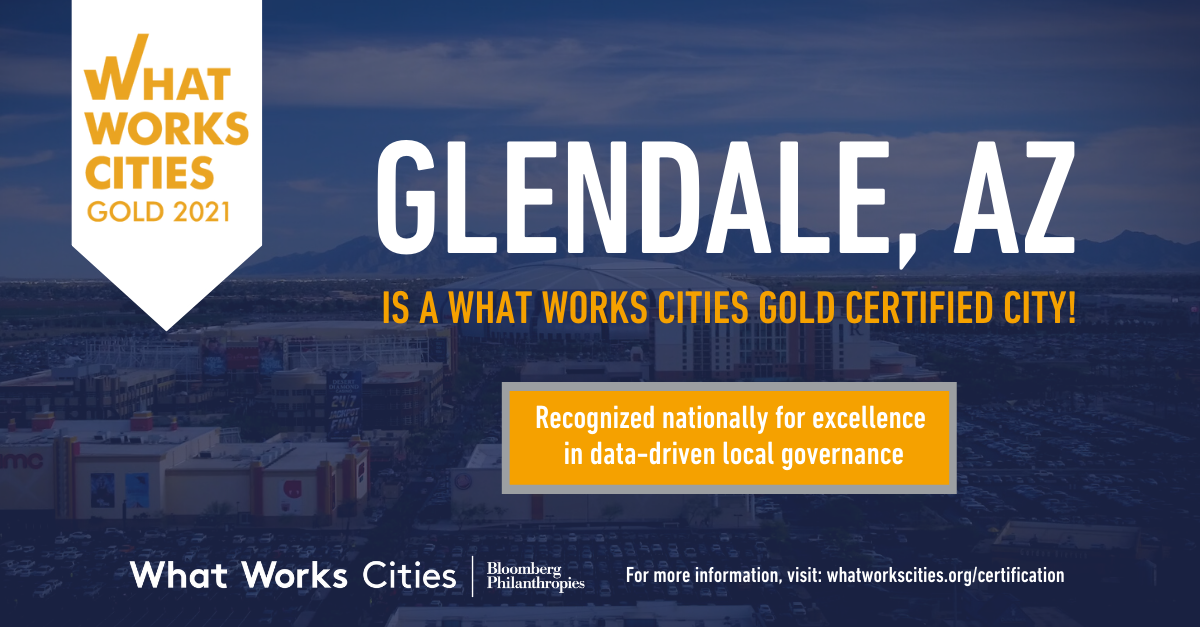What Works Cities

Glendale is thrilled to be recognized by What Works Cities for our investment in data and transparency as part of our decision-making processes across the city.
We look forward to building on this achievement moving forward to continue making a positive impact on the lives of resident

Foundational Practices
Data Governance
The Data Governance foundational practices reviews the presence of an authoritative body to lead and oversee data inventory in alignment with citywide technical, privacy, and strategic objectives.
The Data governance program was implemented in 2020. This program ensures that Glendale is using and collecting data in appropriate ways and treats it as the valuable asset they are. More information on the program can be found on the Department of Organizational Performance page.
General Management
The practice area of General Management ensures that a strong foundation for the effective use of data and evidence to drive decision-making in local governments starts with the chief executive and local government leadership explicitly communicating and demonstrating to staff that governing with data and evidence is an organizational expectation.
Glendale's Mayor and City Manager ensure that the city has this foundation. They do this not only by their communications around the importance of data, but by assigning teams to oversee areas of data usage and management such as citywide performance management, data governance, and results driven contracting.
Open Data
The foundational area of Open Data reviews the practice of proactively making electronic data records publicly available - in whole or in part - and legally open without restriction on use or re-use. Included in this practice is the creation of sustainable open data systems that promote informed decision-making, transparency, and robust citizen engagement.
Glendale does this through the Open Data Portal. The portal allows citizens to access data, downloaded it for analysis, and request additional datasets.
Performance Analytics
Performance Analytics is the practice of studying how to perform better and applying those insights into the operational decision-making process, solving local government problems through performance management systems, and creating a culture of accountability.
Glendale has done this though the creation of the Department of Organizational Performance, the Balanced Scorecard Strategic Plan and performance based budgeting practices.
Repurposing
Repurposing is a strategic process that local governments use to shift funding and resources from ineffective programs and services, to those that are evidence-based and resident-focused.
Glendale has done this through our budgeting process.
Results Driven Contracting
Results Driven Contracting (RDC) is a set of strategies to structure, evaluate, and actively manage contracts strategically, using data to help local governments leverage procurement as a tool to make progress on their highest priority goals.
Glendale has a RDC team that works to identify high priority contracts that are up for renewal that are candidates for the RDC process. These contracts include performance metrics and tracking to ensure that the vendors are not only fulfilling the contracts but that problems are captured and addressed early.
Stakeholder Engagement
Stakeholder Engagement is the practice of facilitating opportunities for the community's use of open data to solve pressing challenges, going beyond open data policies and portal.
Glendale provides how-to guidance on our Open Data Portal and a place for residents to provide feedback on the data available.
Evaluations
Evaluations is the practice of reviewing practices, policies and processes to ensure they are meeting the needs of staff and the public. Evaluations use standard research methods to help cities gain insights into how to improve.
Glendale runs behavioral insight trials, and convenes process improvement teams to review specific operations are that identified as having potential for improvement or that are needing realignment with the cities goals.
About What Works Certification
- What Works Cities Certification is the national standard for excellence in well-managed, data-driven local government. Certification evaluates how well cities are managed by measuring the extent to which leaders incorporate data and evidence in decision-making.
- What Works Cities Certification provides cities with a rigorous benchmark of a city's overall progress on foundational data practices and a customized roadmap for building the capacity and culture of using data to drive decisions that ultimately impact the lives of residents.
- The cities that achieve Certification are demonstrating excellence by investing in the people, processes, and policies to put data and evidence at the center of decision-making.
- The What Works Cities Standard defines how local governments can create a strong foundation for the effective use of data and evidence. The Standard's 45 indicators, organized around eight foundational practice areas, serve as the What Works Cities Certification criteria and define the fundamentals of data-driven governance.
- Nearly 200 cities have had their practices evaluated against these criteria by completing a What Works Cities Assessment. Cities that complete a What Works Cities Assessment are taking the first step to committing to continuous data-driven improvement, in order to innovate and deliver better results for residents.
- As of early, 2022, only 55 cities have achieved Certification.
- What Works Cities Certification was developed by a team of experts at Results for America, in close consultation with the What Works Cities Certification Standard Committee, a third-party cross-sector group of leaders from more than a dozen organizations that support or work alongside cities. The Standard Committee endorses and lends their knowledge and experience to Certification and serves as advisors in the assessment process.
- What Work Cities (WWC), launched by Bloomberg Philanthropies in 2015, is a national initiative that helps cities use data and evidence more effectively to tackle their most pressing challenges. Cities in the What Works Cities community have access to technical assistance and a variety of learning opportunities from expert partners to grow and build their data practices and culture. For more information, visit whatworkscities.org.
Documents